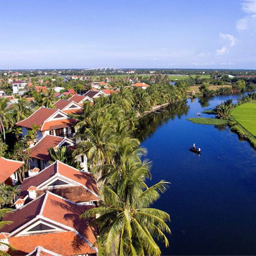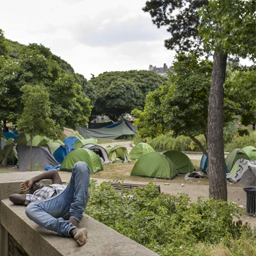With rats running wild, lice outbreaks, and scabies, Nantes noticed the plight of nearly 450 migrants, living in makeshift arrangements in the heart of the city.
Until July, the camp of Square Daviais, already being referred to as the “jungle of Nantes”, was the home of asylum seekers coming from disturbed African nations like Guinea, Eritrea, and Sudan.
Stuffing themselves in improvised shelters, the migrants were living in obnoxious conditions, to say the least.
With just one public toilet in the vicinity and no shower, poor hygiene and alarming sanitary situation plagued the asylum seekers for almost 5 months.
How Did This State Of Affairs Unfold?

Nantes, the riverside city in the Upper Brittany region of western France, is a home to 300,000 people. Once a bustling seaport in the estuary of the Loire, the industrial centre is France’s 2nd most-successful commercial hub after Paris, in terms of employment growth.
In one year’s time, the city has seen a drastic rise in the number of asylum seekers. While asylum applications and migrants’ arrival have dwindled in most French cities, Nantes, according to official reports, experienced a 28 per cent jump since February this year.
Till the first half of June, there were few tents in the camp of Square Daviais, but it increased day by day.
Things took a turn for the worse after successive evacuations of squatters from two private buildings.
To add insult to injury, more Eritreans and Sudanese migrants entered Nantes from Spain and Italy, propelling the total count to 450. The situation seemed like a puzzle for government authorities, impossible to fix.
The City Of Nantes Decides To Clear Migrants From Square Daviais

Concerned about cases of scabies, and the overall deteriorating health condition of migrants in a small-size public garden that has only one sanitary and one water point, regional authorities, in July, ordered a clearing operation.
The clearing operation began on a Monday morning around 08:15 am, with police officers handing out evacuation papers to the migrants, asking them to leave the camp of Square Daviais.
All 450 asylum seekers left Square Daviais without hurry, carrying their belongings with them, but leaving behind the mattresses and tents.
Regional authorities took utmost caution during the clearing operation, keeping in mind the high-level of risks associated with the health and safety of the local public.
Nantes Is Finding Solutions To The Migrant Crisis

The situation in the camp of Square Daviais is non-sustainable, it is not acceptable, stated Johanna Rolland, the current mayor of the city of Nantes.
She asked the authorities to make alternative accommodations to lodge the migrants. These men and women have dignity.
They cannot continue to live in make-do camps for a long time, said Johanna, in an interview with Ouest-France, a regional newspaper.
The government is opening new places for the migrants at the Reception Center for Asylum Seekers; Rolland assured. Officials confirmed they found 100 spaces as emergency shelters to house women, children, and those unwell.
Many are, however, not optimistic about living arrangements the government is making for asylum seekers.
100 spaces mean, over 300 people will sleep on the streets without mattresses and tents, said Francois, who works for a local group that helps migrants. They will go to another place, to some other park, and the authorities will sort out nothing, he added.
What Next?

Although the number of migrants entering Europe fell, France received a record 100,000 applications for asylum last year.
To address the increasing migrant crisis, the Emmanuel Macron government introduced a new immigration bill, approved by the French National Assembly by 228 votes to 139, with 24 abstentions.
The new immigration bill, labelled as controversial, aims to shorten the deadline for asylum applications while expediting the deportation process.
Government sources said migrants who cannot seek asylum or legal residency, or who have sought asylum in another member state of the European Union, will have to leave France.
The new asylum law also introduces a one-year prison sentence for illegal entry into French territory.


